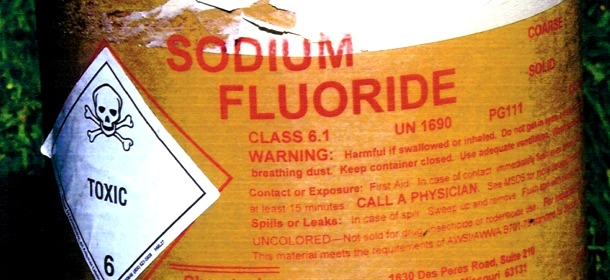
The debate over whether or not fluoridated water is a good thing or not has been raging for years.
Fluoride is a known neurotoxin, and many scientists claim, despite massive amounts of evidence to the contrary, that it is perfectly safe to ingest in your drinking water.

BYPASS THE CENSORS
Sign up to get unfiltered news delivered straight to your inbox.
You can unsubscribe any time. By subscribing you agree to our Terms of Use
Latest Video
Yet a new study linking Fluoridation of water to hypothyroidism is causing tidal waves in the scientific community, in addition to adding to mounting evidence that Fluoridation might just not be the best thing for our bodies.
The real question is, when does the problems fluoridation cause finally outweigh the supposed “benefits”? Collective Evolution reports:
According to a new study from England, high levels of fluoride in drinking water appear to be associated with an increased risk for hypothyroidism. This study has raised concerns about the validity of water fluoridation as a safe public health measure.
The Study
This report, published on February 24th in the Journal of Epidemiology and Community Health, discusses the first population-level study that investigates the association between fluoride levels in drinking water and the instance of the disease hypothyroidism. In case you were wondering, hypothyroidism, also known as underactive thyroid, is a condition where the thyroid is not creating enough of the thyroid hormone. The thyroid hormone is responsible for regulating how the body uses energy. Without this hormone many of the body’s normal functions slow down.
A comparison was drawn between the West Midlands, a completely fluoridated area (adding at least 0.7 mg/L), and Greater Manchester, a non-fluoridated area (0.3 mg/L or less), and they found that nearly twice the risk for hypothyroidism was detected in the West Midlands.
The lead investigator of the study, Professor Stephen Peckham from the University of Kent, told Medscape Medical News: “I think the results clearly demonstrate an increased risk of hypothyroidism associated with areas of (high) water fluoridation.” The study also “raises questions about the safety of community fluoridation,” add Peckham and his colleagues.
Opposition
In contrast to the study, the British Dental Association (BDA) expressed their doubts. Advisor to the BDA Damien Walmsley said: “No definitive conclusions can be drawn about the cause and effect from the data, we mustn’t forget that fluoridation has a proven benefit in reducing high rates of tooth decay, particularly among those living in the most deprived communities.”
This is interesting because there has been quite a bit of information that has come out to suggest that adding fluoride to our drinking water has no effect on our teeth at all. You can read more about that here. This isn’t to say that topical application doesn’t have benefit for our teeth, but ingesting it is a whole other story.
Removing Fluoride
It is worth mentioning that many communities across the globe have recently begun removing fluoride from their drinking water. There have been more and more questions arising in regards to the safety of water fluoridation as a whole. To learn more about this sensitive issue, please see the links that are provided below.
Some people view water fluoridation as forced mass medication to the public, since so many people know about the possible associated dangers but don’t have a choice about whether or not it is added to the water supply. Shouldn’t we have a choice about what is being added directly to our drinking water?
We want to know what you think about fluoridation. Sound off in the comments below!


